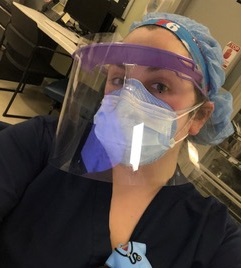Rowan nursing students report from COVID-19’s front lines
Rowan nursing students report from COVID-19’s front lines

Registered nurses balancing work with their studies at Rowan University found themselves on the front lines of the pandemic last semester. Their experiences in hospitals, nursing homes and clinics tested their resiliency.
“They came out like champions,” said Dr. Mary Ellen Santucci, a registered nurse and chair of the Department of Nursing at Rowan’s School of Health Professions. Despite overwhelming workloads, most students completed their courses.
“I’m in total awe of what they managed to do,” Santucci said. “It shows you their dedication to their education, as well as to their patient care.”
Tiara Farmer is a nurse coordinator at an outpatient center during the week, but she spent her weekends this spring filling in at a short-staffed nursing home in a North Jersey area hit hard by the virus.
“The need was just so high,” said Farmer, who allowed a patient to use her plastic-wrapped iPhone to say goodbye to a dying spouse. “I’ve never seen that much death.”
Witnessing the pandemic’s toll was a life-changing experience, Farmer said, one that reinforced her desire to care for the sick.
“Give me my mask and I’m there,” Farmer said. “I’ll do anything.”
After his daughter was born during New Jersey’s stay-at-home orders, Chris Lugo spent four weeks away from home working the night shift at a Staten Island hospital emergency department. Before returning home, he quarantined himself for two weeks in a hotel room.
“It was a very difficult decision for us as a family,” said Lugo, 31. “It was ultimately worth it. I got to keep her safe.”
Given the circumstances, he opted to drop one of his four classes last semester. Though the pandemic led him to question his career choice, Lugo views it as a call of duty.
“I love what I do,” Lugo said. “A lot of people don’t realize it’s a very difficult job. They don’t realize the stress, the deaths you see every day, the mental health you deal with yourself … I don’t regret it for a minute.”
When schools closed, Briana Cruz sent her two kids, ages 14 and 9, to stay with their father for a month, while she covered for sick co-workers at her two nursing jobs.
“It was horrible,” Cruz said. “It was very stressful to try to manage both jobs, and try to be a student at the same time … and then you had to take on the role of a teacher.”
Things are calmer now, but Cruz is concerned about infections this fall.
“I think that we have to be just as cautious now and make that a regular thing in our lives,” Cruz said. “We need to make sure we’re hand-washing, wearing our masks, and try to distance ourselves as much as possible still.”
Patrice Henry-Thatcher found herself sitting in her car for two hours after a traumatic hospital shift, trying to process what she had just witnessed.
As an academic advisor for Rowan’s nursing program, she’s curious about the pandemic’s mental health effects on medical personnel. Nurses, she said, are “like superstars.”
“We’re on the front lines,” Henry-Thatcher said. “We’re seeing the death and dying … It’s a very traumatic experience. I’ve been a nurse for 15 years, and I’ve never experienced anything like this in my life.”
Erica Eisenstein, 27, wore full personal protective equipment while working in her hospital emergency department, but in early May, she contracted the virus herself, along with four family members. She lost her sense of smell and suffered severe nausea and vomiting, followed by coughing and shortness of breath.
“Even getting into the shower took a lot,” Eisenstein said. “It’s just scary that it affected me really hard.”
Nurses said they will continue to take precautions against the virus, even after government restrictions on businesses and gatherings are lifted.
“I canceled my plans for most of the summer,” Eisenstein said. “This is one year out of our lives that we have to sacrifice. If you really care about other people and their health, you would do your part.”
“COVID is still out there; it’s not like it disappeared and went away,” Lugo said. “I don’t think we’re going to go back to normal life ever again.”